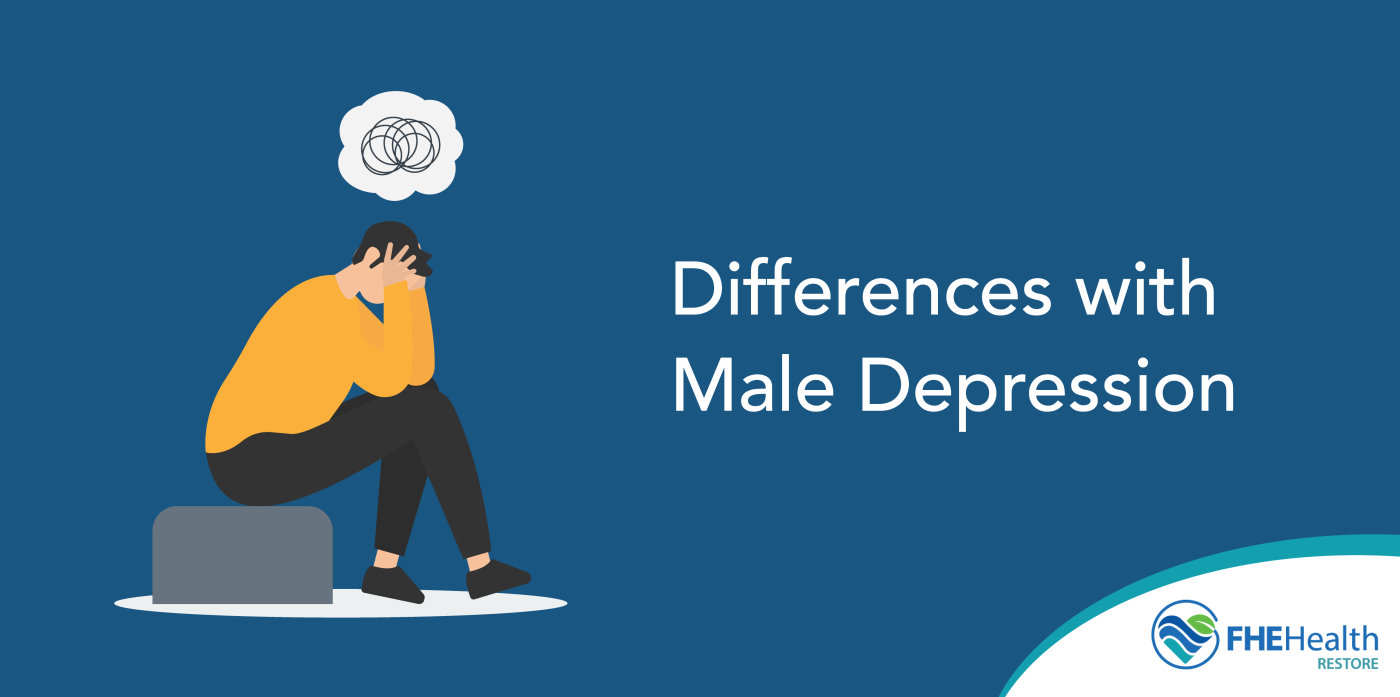Depression is one of the most widespread mental conditions in the world. The World Health Organization (WHO) estimates that 5% of the global population suffers from depression. Statistically, it’s known that more women than men suffer from depression, but that doesn’t mean men aren’t significantly impacted. In fact, male depression symptoms and how men react to and report their depression greatly differ from women.
Male vs. Female Depression: An Overview
According to the CDC, the age-standardized rate of depression among women in the United States sits at 24%, while it’s only 13.3% for men. Nearly 1 in 10 men experiences depression or anxiety, but less than half will seek treatment.
Most shockingly, in 2020, the rate of suicide was four times higher for men compared to women. Why? Men simply are more likely to go undiagnosed or misdiagnosed for their depression. And because depression can worsen and become life-threatening when left untreated, more men are succumbing to suicide.
Depression in men is being missed for several reasons:
- Men have a lot of societal expectations of them to be strong, and many still hold onto an outdated belief that seeking help is being weak. As a result, men are much less likely to self-report their symptoms.
- Depression presents itself differently in men, causing both the patient and medical professional to miss the warning signs.
Male Depression Symptoms: How Symptoms Differ From General Depression
Most people today believe the symptoms of depression are crying, feeling sad and isolating. That’s certainly true for women, but men often showcase their depression in different ways.
Instead of showing sadness, men are more likely to become aggressive, irritable, frustrated and even violent. Additionally, men are more likely than women to showcase physical symptoms of their depression. This includes aches and pains, headaches, digestive issues and lethargy. Because these aren’t the “typical” symptoms frequently associated with depression, men — and those around them — often don’t recognize that’s what they’re dealing with.
In the end, more men deal with suicidal thoughts and commit suicide because their depression goes untreated for so long.
Societal Expectations and Emotional Expression for Men
You can’t talk about men’s mental health without bringing up the unfair societal pressures men are put under. Boys are taught very early on that they shouldn’t cry or show their emotions. They’re also taught that being emotionless is “strong.” These beliefs continue into manhood, where men are less likely to express their feelings or ask for help when they’re going through mental health issues.
These expectations for boys and men are harmful in many ways. They prevent men from having deep, meaningful connections with others because they can’t ever truly share their full selves with their spouses, children or family members. As a result, suicide is a leading cause of death for men under 45 in the United States. Men not talking about their emotions and mental health is literally killing them.
Barriers to Seeking Mental Health Help for Men
Some of the barriers that can prevent men from seeking help for their depression are:
- Toxic masculinity. Men may have ingrained beliefs about what it means to be a strong man and that asking for help is unacceptable.
- Social stigma. Some men may believe that friends and family members would make fun of them if they found out about their depression or attempts to get help.
- Unawareness. Because male symptoms of depression aren’t necessarily feeling or acting sad, some men might not even realize they have depression.
- Other coping mechanisms. Men are more likely than women to turn to alternative coping mechanisms over mental health treatment. In some cases, this includes self-medicating with drugs and alcohol.
- Low mental health literacy. Sometimes, men have a lower mental health literacy than women because mental health isn’t a topic that’s frequently discussed among male groups. As a result, men might not realize when they’re in a mental health crisis or might not know what to do when they’re struggling.
Tailored Approaches to Treatment and Support
When facing mental health concerns, men need to feel empowered to seek help. The best way to encourage men to get help is with a tailored approach. Men might need accommodations to feel comfortable seeking support. For example, a man might feel uncomfortable entering a counselor’s office out of fear that someone they know will see them and judge them. Offering virtual sessions can help men feel more comfortable exploring therapy.
Additionally, depression screenings need to account for how males might present the condition. Primary care providers often perform these screenings, so they should be guided on how to look out for male symptoms.
Ending the Stigma on Men’s Mental Health
Far too many men still feel they must present this “bravado” image that they’re always strong. But men are humans and deserve the same support as anyone else. Everyone needs to work hard to help end the toxic masculinity beliefs that surround men and their mental health.
Women can support the change by talking to men about their mental health, encouraging them to share their emotions and never judging or shaming men for being vulnerable.
Schools need to do better by educating men on their mental health. For example, men should be taught that they may present different depression symptoms than women so they can see the signs in themselves.
And lastly, men should also take on the challenge of instigating change. If every man started being more transparent about their mental health with other males, it could help others feel more comfortable opening up.
Depression Treatment at Restore Mental Health
Depression isn’t a condition that goes away on its own. But it’s highly treatable if you seek professional help. You don’t have to suffer with your condition any longer. Contact Restore Mental Health today to learn how we can help you feel like your old self again.



